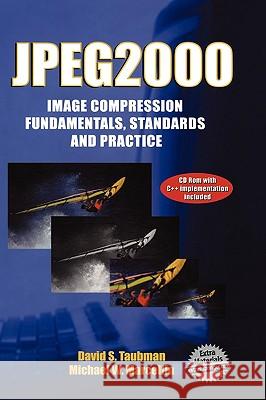Jpeg2000 Image Compression Fundamentals, Standards and Practice: Image Compression Fundamentals, Standards and Practice » książka
Jpeg2000 Image Compression Fundamentals, Standards and Practice: Image Compression Fundamentals, Standards and Practice
ISBN-13: 9780792375197 / Angielski / Twarda / 2001 / 777 str.
Jpeg2000 Image Compression Fundamentals, Standards and Practice: Image Compression Fundamentals, Standards and Practice
ISBN-13: 9780792375197 / Angielski / Twarda / 2001 / 777 str.
(netto: 575,06 VAT: 5%)
Najniższa cena z 30 dni: 578,30
ok. 16-18 dni roboczych.
Darmowa dostawa!
JPEG2000: Image Compression Fundamentals, Standards and Practice is an essential reference for professional engineers and academic researchers in the fields of communication, image processing, signal processing, information theory, and multimedia. It has specific applications for those involved in the development of software and hardware solutions for multimedia, internet, and medical imaging applications, and for those pursuing research in image and video compression.
The book is suitable as a primary text for a course in image compression; it would also be helpful in the context of a more general class covering multimedia compression at an in-depth level. Final year engineering undergraduate students pursuing projects in multimedia compression and/or communication would also find the book a useful tool.
JPEG2000: Image Compression Fundamentals, Standards and Practice is written in four parts, to serve the interests of a wide readership.
Representing about half the total text, Part I of the book provides a thorough and up-to-date background in the fundamentals of image compression, including topics not previously brought together in a single volume.
Part 2 contains a complete description of the JPEG2000 standard. This description is written in such a way as to be completely self-contained from an implementation perspective, while it contains numerous references to the fundamental developments in Part 1. Together, Parts 1 and 2 serve the complementary roles of explanation and exposition in relation to both the JPEG2000 standard and modern image compression techniques.
Part 3 of the book is devoted to the implementation and exploitation of the JPEG2000 standard, containing guidelines, suggestions, and analyses for both software and hardware oriented applications.
Part 4 describes other key image compression standards, namely JPEG and JPEG-LS. The purpose of this material is to allow the reader to compare the capabilities and complexity associated with these standards with those of JPEG2000. This final part of the book also serves to provide a practical demonstration of some of the fundamental techniques introduced in Part 1 which are not demonstrated by the JPEG2000 standard.











